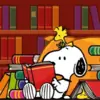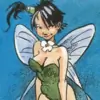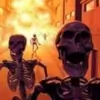a little bit of pride...
Colin Cotterill: 1. Killed at the Whim of a Hat (385p.) - 2. Grandpa, there's a Head on the Beach (337p.) - 3. The Axe Factor (303p.)
Apart from the humerous language (+ irony+sarcasm) and bizzare (crime-)happenings, one learns a lot about life in Thailand. Cotterill, with British and Australian citizenship, lives in Thailand.
There is a little bit of "pride" in this series, as a sibling of the protagonist is transsexual. Jimm Juree (the female protagonist) introduces this member of her family as "my sister Sissi who used to be my older brother Somkiet". The first description of her older sister sounds a bit strange: "She wore sunglasses and a thick scarf despite the summer heat, because she couldn't be persuaded that the saggy skin on her neck made her look like a turkey. That wasn't the case; her neck was fine. There was really nothing sadder than an aging transsexual ex-beautyqueen. At least, that's what I used to think." That will change  During the crime investigations, Sissi is the one who does the Internet research work (legal and illegal) when needed...
During the crime investigations, Sissi is the one who does the Internet research work (legal and illegal) when needed...
This is just a small review:
In the first volume, crime reporter Jim Juree has to cope with the move from the big city to the backward province of southern Thailand, along with the threat of a career setback. Jimm's mother had the spontaneous idea to exchange the profitable grocery store / residential building in the city for a holiday resort to be managed on the coast. The family consisting of Mair (mother, who is on the verge of dementia), the muscular and extremely sensitive younger brother Arny, as well as the retired Grandpa Jah (ex-policeman) live in the holiday complex, while Sissi was left behind in the city. Although there is no local newspaper of the caliber of her former employer, Jimm has set her mind on pursuing her journalistic passion in the province - albeit under more difficult conditions, because, among other things, she lacks the technology she is used to. However, fortunately, she has a sister in 'civilized society' who earns her living from cybercrime and supports the researches.
All three volumes are funny and exciting crime novels which give insights into Thailands culture, history, politics, social problems, etc.
-----------------------------------------------------------------------
Val Mc Dermid: 1. 1979 (408p.) - 2. 1989 (430p.)
Belonging herself to the LGBTQAI+ community, Val McDermid wrote (and still writes) crime novels where the leading investigator is a woman. As she herself worked as a journalist, three of the female protagonists of her five crime series have a journalistic background or work as reporters. Allie Burns of 1979 and 1989 is an investigative reporter. This year, 1999 will get published, a cross over to McDermid's famous crime series which has DCI Carol Jordan and clinical psychologist and profiler Dr.Tony Hill as protagonists.
Homosexuality is part of McDermid's novels, also in 1979 where Allie Burn's fellow-reporter Danny is a closeted gay and she herself starts a relationship with Rona, a lesbian fashion journalist, latter being an integral part of the following novel(s).
In 1989, homosexuality belongs to the main plot as the historical background deals with AIDS, the reactions of society to it and the dubious ways for finding a medical treatment in the then still communist East Germany.
1979 - the topics: We read about the IRA, planned assassinations, and insurance fraud, undercover agents, chases, and a murder—all with the investigative capabilities of the 1970s. Danny and Rona are gay, which was a criminal offense in Scotland at the time, so we also experience how gay people went into hiding. During their collaboration, Danny outs himself to Allie when he invites her to his appartment for the first time to discuss their investigation.
The two quotes I translated from the German audiobook:
[Allie:] "You have to tell me why you freaked out when you saw who G.B. was talking to." [Danny:] "I know him." [Allie:] "Obviously, but how?" Danny frowned and sighed: It's complicated, and when you told me who he was, it got even more complicated. I don't even know where to begin... He blinked nervously and gave her a pitiful look. "I'm like you, Allie." Perplexed, she said: "What do you mean, you're like me?" He looked down. "I'm gay." This was so completely unexpected that she could only stare at him. He looked up. "We're the same kind and we have to hide our homosexuality at Claryon." "What on earth are you saying? I'm not gay, Danny." I--- don't have a problem with you being gay, but I'm not a lesbian."
However, later, Allie will discover that Danny was right. For a long time, Allie remains the only one at the Clarion to know about Danny's sexuality but then, during a police investigation, she betrays his trust:
[Officer to Allie:] "You say Danny wasn't your boyfriend. Maybe that was your problem. He wanted to be your boyfriend, but you were against it.... Did he try to rape you, Allison? It's difficult to talk about, but it's not your fault." The dam broke. "Why don't you listen to me! Danny wasn't interested in me. Danny was gay." As soon as she said these words, she was overcome with shame. ... It would only be a matter of time before it would be gossiped about in the press club.
1989 - the topics: a media mogul with a dubious past, a murder, a kidnapping, the exclusion of men with HIV (AIDS as a gay disease), forbidden drug trials in East Berlin, the fall of the Berlin Wall. My two quotes will be about the dealing with AIDS at this time (from the Kindle version).
Allie: ‘I’m an investigative reporter. ... I want to write about why people with HIV and AIDS are leaving Scotland. I suspect there’s a story there about a lack of provision in the Scottish system. ... how did you end up here? ... What about treatment?’ [Jamesie] shook his head. ‘There isn’t any treatment, is there? Not once you’ve got full-blown AIDS. They can’t make us better. ... In Edinburgh, I couldn’t get into rehab or any other treatment after I was diagnosed. There were no beds. No spaces. What clinics there are, they’re bursting at the seams. We’re just dumped on a scrapheap. ... And guys like me, we don’t have anybody that wants to take care of us. No cuddles from Princess Diana for the likes of us. So I came down here, where nobody knew I was HIV positive. I thought I could escape that feeling that I had a target on my back. ... Don’t get me wrong. There’s some doctors and nurses working their arses off to help us. But there’s a hell of a lot more who wish we’d just crawl into a corner and die. They f*cking hate us.’
Allie in conversation with Dr Butler who runs the Manchaster clinic where Jamesie from Edinburgh is treated: [Allie:] ‘What about medical research? Are they making progress? Are you working with any of the pharmaceutical companies?’ ... ‘We’re not big enough. We wouldn’t give them the statistically significant results they need. I know there were some trials going on in Edinburgh, but I don’t know what happened.’ ‘What do you mean, what happened?’ He shrugged. ‘Your guess is as good as mine. They just stopped.’
-----------------------------------------------------------------
Kacen Callender: 1. Felix Ever After (368p.) - 2. Lark & Kasim Start a Revolution (363p.)
Kacen Callender, who is non-binary and Black, has a knack for bringing the LGBTQIA+ community closer to readers. Her teenage protagonists are refreshingly natural and relatable. Felix Ever After was published when Kaven was 20, and the story of Lark and Kasim came two years later.
Felix Ever After
The "ever after" reminds me of the wedding saying "happily ever after"...yes, and "Felix" also means "the happy one." But until 17-year-old Felix feels truly happy in his own skin and world, it takes not only the entire book, but also a few friends (and enemies).
Until he was 12, Felix was a girl, but only biologically, not emotionally. His father gives him everything he needs to get transformed into a boy, but he can't bring himself to name his transgender child Felix...he says "kid." Felix never was in love yet but he has a close friend, Ezra with whom he spends most of his time – in school and also many nights in Ezra's home.
[Felix, the narrator] I'm back up to my dad's apartment... “The prodigal son returns” my dad says, only slightly passive-aggressively. ... I don't know why he's suddenly annoyed that I'm staying at Ezra's. ... We'd agreed that I split my time between home and Ezra's. ... “Hey, kid, ... ,maybe you should give Ezra's apartment a break.” ... “I'm not sure how I feel about you spending all that time with a boy.” I freeze. It's the sort of thing my dad would say before he knew I was a guy. ... “I like staying down by Ezra's, because at least with him, I never have to feel like he doesn't respect me.” “And what does that mean?” “I mean he knows that I'm a guy,” I say, ignoring the flinch of shame deep inside me - these days, I don't even know if I'm a guy myself. “...I mean that he calls me by my name: Felix.”...I feel like a shitty son, getting angry at my dad when he's the one who paid for my hormones, my doctor's visits, my surgery – but every time I'm around him, I feel like I have to work hard to prove that I am who I say I am. It pisses me off that he doesn't just accept it. ... “I've had a certain idea of who you are in my head for twelve years. That's a long time.”
And it's a long quote but it tells some of Felix's dilemma. He wants to be loved for the person he is. Regularly he writes emails to his mom who left him and his father and never responds to one of the mails.
Hey Mom, Here's something I haven't told you yet: even though I came out to you as a trans guy in an email, I'm not sure if I'm actually a guy. It's a hard feeling to describe. It's like...just this sense, this feeling in my gut that something isn't totally right. I know that I'm definitely not a girl. But that's all I know.
Then there's Deaclan, who at first comes across as a bit of an a**hole. Ezra and Deaclan were lovers for a year, but are no longer. However, the more you get to know Deaclan, the clearer it becomes that he doesn't have it easy and is just good at hiding his insecurities. A very interesting character, and also deep.
The story takes place in New York. Historical aspects are also incorporated. Christopher Street Day and its significance, both in the past and for visitors today, are very interesting.
To me, the detailed characters, the lively language, the diversity of the LGBTQIA+ community and the honest handling of one's own feelings made Karen Callender's book a pleasure to read.
Lark & Kasim Start a Revolution
Lark Winters publishes his thoughts and threads on Twitter and is now looking for an agency willing to publish a book he's still writing. But he receives one agency rejection after another. Too young, too queer, too emotional — no one seems to recognize the story's relevance for nonbinary people like Lark. Suddenly, a tweet-thread about unrequited love appears on Lark's Twitter account and immediately goes viral (side note: one uses the pronouns "they" and "them" when talking about a nonbinary person).
How do I tell them that I love them? Maybe it's too late to tell them how I really feel. That I've had these feelings for months, for years, as long as I know them. It'd kill me if they pushed me away. If they told me that they don't feel the same. Maybe it's better, then, to just keep loving them silently. Just be grateful for the relationship we have now, even when I'm afraid that they might hate me. How do I tell them that I love them? That's the question I asked, but I already figured the answer out, all on my own: I don't. I don't tell them that I love them. No matter how much it hurts.
Lark's dream becomes a reality as he finally gets the attention he's been longing for all along. The only problem: Lark never wrote the tweet! It actually was Lark's former best (but now estrainged) friend Kasim who used Lark's PC whithout latter's knowledge. Lark must choose: live the dream to be loved based on a lie, or find out what's behind Kasim's tweet and what happened to their friendship...
As in FelixEverAfter, the characters are very well-developed; I found it easy to empathize with them. At 17, Lark still has to learn where they stands and what goals are important to them. The other characters are also convincing, especially Kasim, whose problems only become clear over time. Overall, it's nice to see the characters grow and experience how they become aware of their weaknesses and emerge stronger from them.
Lark wants to be loved, but his mom says: "Not everyone is going to like you. ... You'll spend your entire life trying to mould you into someone else, but then you'll realise you wasted all that time getting others to like someone who isn't even you.” But if I can mold myself into someone else and change the parts of me that people don't like, then why shouldn't I? This world already has enough excuses to hate someone like me.
Eventually, through a well relatable 'journey', Lark comes to a quite mature conclusion and writes on Twitter:
I know that most people will be angry with what I have to say but I've decided to stop caring. That's a hard thing for me to do. I've always cared about what people think of me. But I realised it was because I hated myself, and I needed their love as permission to feel worthy of love. I want to love myself. I think I'm finally starting to. A part of loving myself has been learning to take accountability and responsibility. It's also about creating bounderies for safety. ... This journey on social media has been unhealthy for me. This has been an unsafe place. And I can't heal in a space that wants to harm me. So, with that, I will delete this account. ... I love you all. I really do mean that. Sincerely, Lark.
Kacen Callender has tackled a number of difficult, sometimes relatively unknown topics: homophobia, racism, neurodiversity, (cyber) bullying and mental health issues, but also love, friendship and polyamory (= engaging in multiple romantic relationships, with the consent of all the people involved). The love story that Kacen Callender depicts, doesn't correspond to the classic, stereotypical image on many levels but is (imo) very well implemented and explained.
The wealth of topics can certainly be overwhelming for those unfamiliar with the subject matter. I recommend reading "Felix Ever After" first as an easier introduction. I would recommend this sequel to people who would like to read a novel with a high representation of queer characters.
--------------------------------------------
Alice Oseman: Loveless (499 p)
Loveless seems to me to be a wonderful addition to Kacen's two books, as this time it features a female protagonist who gives us insight into what the "A" in LGBTQIA means.
“I loved—loved!—love. I know that's corny. But I was never cynical. A dreamer, perhaps, who believed in the magic of love and longed for it." Georgia likes romantic movies and is an avid reader of romantic fiction, but she realizes that she herself has never really fallen in love. First love, the first kiss, tender encounters, and the development of deep feelings for another person are important elements not only in books. But what if you're like Georgia? Almost desperately, she tries everything to be like everyone else, certain that it just takes a little longer. She's supported by Rooney, her dorm roommate at the university, who is Georgia's exact opposite—extroverted and open about sex. She gives her well-intentioned advices and ultimately suggests that Georgia should 'try' Jason, Georgia's childhood friend. However, this turns out to be more likely to lead to the destruction of a deep friendship.
As it was in FelixEverAfter a pride self-help group, in Loveless it is the institution Pride Society and the member Sunil that initiates and supports self-discovery and a positive emotional development. Georgia has to admit that “even though I longed for these things, I knew they would never have made me happy anyway. The idea of them was always nice. But the reality made me sick."
Sexuality, self-discovery, acceptance, diversity, love, and friendship—these are the things "Loveless" is about. The story is touching, authentic, instructive, clever, funny and serious. It's animated with numerous queer characters and brimming with emotion. Although it's not a classic romance, it contains a great deal of love. Love is simply so much more than romance and sex. Friendship is love, too, and just as meaningful and precious as romantic and sexual relationships.
Alice Oseman has created a powerful, believable young woman who not only gets to know herself, but also questions things that are firmly anchored in society as normal - first love, relationships and ultimately marriage and starting a family. Actually, I liked all of the main characters because they have depth and are very different and one learns a lot about asexuality/aromanticism.
--------------------------------------------------------
Jonathan Kellerman: Over the Edge (452p)
Child psychologist Dr. Alex Delaware receives a late-night call from a former patient (Jeremy). The patient is babbling incoherently. The psychologist goes to a mental hospital to see the patient, only to discover that he has just escaped. Next, the patient is discovered sitting among a pile of corpses with a bloody knife in his hand, his circumstantial evidence outing him as a mass murderer. The psychologist is hired by the patient's lawyer to determine insanity. The lawyer is weird. The family is weird. The patient is weird anyway. The patient's friends are weird. The mental hospital staff are weird.
What I like about the story is - among other things - the psychological and also the medical part, as it deals with the effects and interactions of different medications.
Jonathan Kellerman is not only a highly successful and prolific author, but also a child psychologist and psychological consultant at the Los Angeles Superior Court. His main work is the thriller series featuring child psychologist Dr. Alex Delaware and his friend, the gay police officer Milo Sturges. Like his creator, Alex lives and works in LA, is married (his wife is a trained instrument maker and repairs all kinds of stringed instruments for famous artists), and provides psychological reports on children in custody for family court.
Milo's position and work in the LAPD is affected by his known homosexuality and it is interesting to read the changing from the first book (When the Bough Breaks) in 1985 to the 40th one in 2025. Milo has a long-time live-in relationship with a surgeon working in a LA hospital and regularly involves his friend Alex in his murder investigations.
------------------------------------------------
Scott Turow: Suspect (449 p.)
The main protagonists are two women, one being a sheriff, the other a female investigator working for an attorney.
For as long as Lucia Gomez has been the police chief in the city of Highland Isle, near Kindle County, she has known that any woman in law enforcement must walk a precarious line between authority and camaraderie to gain respect. She has maintained a spotless reputation—until now. Three male police officers have accused her of soliciting sex in exchange for promotions to higher ranks. With few people left who she can trust, Chief Gomez turns to an old friend, Rik Dudek, to act as her attorney in the federal grand jury investigation, insisting to Rik that the accusations against her are part of an ugly smear campaign designed to destroy her career and empower her enemies—both outside the police force and within..
Clarice "Pinky" Granum is about as unconventional of an investigator as you could possibly imagine. The granddaughter of a well-respected lawyer, Pinky spent much of her youth experimenting with different drugs, having casual romantic trists with both genders, and coming up short in every undertaking she attempted. Her last big failure came as she was booted from the police academy. Pinky has landed on her feet though. She now works as a licensed private investigator for Rik Dudek, looking into the minor cases that he takes on. When Rik agrees to represent disgraced police chief Gomez, Pinky knows she will need to keep her head down and stay out of trouble. She's about to find out, though, that keeping a low profile is easier said than done.
II found Suspect to be an engaging read with a bisexual main character that really helped to differentiate this book from the other Scott Turow Kindle County legal thrillers.
-----------------------------------------------















 I really liked how well Iris handled Stevie's nerves and spiraling, she was always understanding and supportive and perfect
I really liked how well Iris handled Stevie's nerves and spiraling, she was always understanding and supportive and perfect  I also liked how she had her own insecurities and vulnerabilities hidden deep within her confident persona. Both of them were so right for each other, they helped each other grow. I liked the resolution, too. I'm all for fictional couples needing each other like they need air, but there's something about wanting to be with someone even when you don't "need" them. There's such a cozy, special vibe to these relationships :)
I also liked how she had her own insecurities and vulnerabilities hidden deep within her confident persona. Both of them were so right for each other, they helped each other grow. I liked the resolution, too. I'm all for fictional couples needing each other like they need air, but there's something about wanting to be with someone even when you don't "need" them. There's such a cozy, special vibe to these relationships :)
 ). I also loved Etta — trying to be tough but so vulnerable underneath. I genuinely adored Linus and Etta's friendship. Also, "the bet" is one of my favourite tropes, simply bcz of the angst and drama it always brings in, and seeing it used in a platonic setting was so good. However, I had some qualms about how Linus reacted to his grandma throughout the book. Maybe it was my desi upbringing but I felt it was kinda selfish and uncaring. I'm glad it all got communicated and sorted out later, but I do think a bit more understanding should've been shown (I blame the parents more than Linus, though). Overall, this book could've used some more family communication, but it was a quick, enjoyable read. As always, I love seeing my MCs find their voice and footing in life, especially if it's paired with some solid friendship ❤️
). I also loved Etta — trying to be tough but so vulnerable underneath. I genuinely adored Linus and Etta's friendship. Also, "the bet" is one of my favourite tropes, simply bcz of the angst and drama it always brings in, and seeing it used in a platonic setting was so good. However, I had some qualms about how Linus reacted to his grandma throughout the book. Maybe it was my desi upbringing but I felt it was kinda selfish and uncaring. I'm glad it all got communicated and sorted out later, but I do think a bit more understanding should've been shown (I blame the parents more than Linus, though). Overall, this book could've used some more family communication, but it was a quick, enjoyable read. As always, I love seeing my MCs find their voice and footing in life, especially if it's paired with some solid friendship ❤️













 But by the end, I liked the equation and comfort between the two men. I also liked how they incorporated a chapter with Bran's father Levi's PoV.
But by the end, I liked the equation and comfort between the two men. I also liked how they incorporated a chapter with Bran's father Levi's PoV.














16